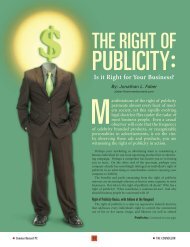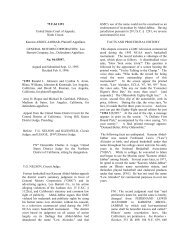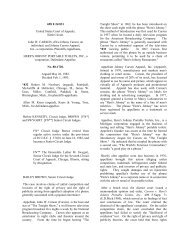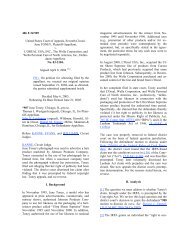Rufo v. OJ Simpson - Right Of Publicity
Rufo v. OJ Simpson - Right Of Publicity
Rufo v. OJ Simpson - Right Of Publicity
Create successful ePaper yourself
Turn your PDF publications into a flip-book with our unique Google optimized e-Paper software.
Page 11<br />
kill her, but also serves to rebut <strong>Simpson</strong>'s claims to the contrary."<br />
In its pretrial ruling denying <strong>Simpson</strong>'s motion in limine, the court<br />
indicated that although it would not make final determinations until<br />
specific evidence was offered at trial, it was reasonable to assume<br />
that the nature of the relationship between <strong>Simpson</strong> and Nicole would be<br />
a relevant issue.<br />
Consistent with the pretrial memo, Goldman's counsel told the jury<br />
in his opening statement that the evidence would show <strong>Simpson</strong> and<br />
Nicole were engaged in a deeply emotional, tense, angry conflict in the<br />
weeks leading up to the killings, and that <strong>Simpson</strong> felt rejection and<br />
rage when Nicole attempted to end their relationship and excluded<br />
<strong>Simpson</strong> from the family circle and celebration at the recital and postrecital<br />
dinner. Counsel for Nicole's estate stated the evidence would<br />
show that in the weeks leading up to the killings <strong>Simpson</strong>'s ego was<br />
bruised to its core by Nicole's finally ending the relationship, and on<br />
the night of the killings by his exclusion from the family circle, and<br />
he committed the killings in a rage. Counsel for <strong>Simpson</strong> told the jury<br />
the evidence would show the relationship between <strong>Simpson</strong> and Nicole was<br />
not acrimonious, <strong>Simpson</strong> was not out of control when they mutually<br />
decided to terminate the relationship and move on with their lives, and<br />
<strong>Simpson</strong> was not in a foul mood at the recital.<br />
During trial, in his memorandum to the court about admissibility of<br />
the telephone call to the battered women's shelter, <strong>Simpson</strong> again<br />
claimed it should be excluded on the ground Nicole's state of mind was<br />
irrelevant. Goldman's memorandum replied the statements in the<br />
telephone call "explain Nicole's conduct in ending the relationship<br />
with defendant and in rejecting him again on June 12, the night of the<br />
murders," or were "admissible as circumstantial evidence of Nicole's<br />
state of mind. Each statement provides highly probative evidence of<br />
Nicole's fear, and helps explain her conduct in rejecting defendant and<br />
not wanting anything to do with him." In arguing the motion Goldman's<br />
counsel contended, "Our theory of the case, Your Honor, as you probably<br />
know, is that the primary motivation for the crime was retaliation from<br />
Ms. Brown's rejection of Mr. <strong>Simpson</strong>, the termination of the<br />
relationship and the rejection, specifically on June 12, as well, after<br />
the recital. And her state of mind about the relationship, the state of<br />
the relationship, her extreme fear of the defendant, as demonstrated by<br />
the phone call [to] Ms. Ney. It is probative of the fact that she would<br />
[*594] not want to be with him and would want to stay as far away from<br />
him as possible. [It very much] goes to her rejection of him." He<br />
argued the evidence impeached <strong>Simpson</strong>'s position that <strong>Simpson</strong> had put<br />
the relationship behind him. He contended the evidence "really goes to<br />
the heart of the motive of the case, as to what's going on in the<br />
relationship in these few days before the murders. As the court in Zack<br />
said, antagonism, hostility, enmity in the relationship is highly<br />
probative and always relevant." The court agreed with plaintiffs'<br />
argument that the evidence was admissible for the limited purpose<br />
offered. Earlier the court had similarly admitted the diary entries.<br />
The court agreed with plaintiffs' contention the diary entries showed<br />
Nicole's state of mind as relevant to the motive issue.<br />
Later when Goldman's counsel sought to cross-examine <strong>Simpson</strong> about<br />
the letter, Goldman's counsel asserted the letter came within the state<br />
of mind exception to the hearsay rule; <strong>Simpson</strong>'s counsel again argued<br />
Nicole's state of mind was not in issue. The court concluded, "I'm







